

UN paper "Wake Up Before It's Too Late" Peak Metals, Minerals, Energy, Wealth, Food and Population; Urgent Policy Considerations for A Sustainable Society. Nature Wants Her Carbon Back Backchannel. Businessinsider. Et si on se débarrassait de nos réfrigérateurs ? Au début des années 1920, le groupe américain General Motors dépose le nom « Frigidaire », aujourd’hui propriété d’Electrolux. Le « frigo » va entrer dans toutes les cuisines, et même dans le dictionnaire. Une petite révolution qui bouscule des siècles d’habitudes de conservation des aliments. Il faudra tout de même attendre les années 1960 pour que ce nouvel appareil électrique, qui permet de garder au frais les denrées périssables, se généralise en France. En 1964, seuls 37 % des foyers français possèdent un réfrigérateur, dix ans plus tard, 88,4 % des familles en sont équipées.
Ce succès tardif est intimement lié à l'urbanisation massive intervenue dans la seconde moitié du XXe siècle, explique Nathalie Damery, présidente de l’Observatoire société et consommation : « A la campagne, beaucoup de choses étaient dans le garde-manger, on gardait les boissons au frais dans la rivière. Comment rémunérer ceux qui participent à «l’économie contributive»? JNDD 2014 : Conférence de Marie-Monique Robin "Les pirates du vivant"
The World According to Monsanto - Marie-Monique Robin. Marie-Monique Robin - Le monde selon Monsanto. Les moissons du futurs. Film débat avec Philippe Desbrosse, Agriculteur et Docteur en sience de l. Les moissons du futur reportage Marie Monique Robin. Interview de Marie-Monique Robin ("Les Moissons du Futur") Assessing the sustainability of the US food system: A life cycle perspective. 10 Calories in, 1 Calorie Out - The Energy We Spend on Food. 10 Calories in, 1 Calorie Out - The Energy We Spend on Food. 38 maps that explain the global economy. Solar irradiance. Annual mean solar irradiation (integral of solar irradiance over a year) at the top of Earth's atmosphere (TOA) and at the planet's surface Types[edit] Hard Evidence: meat means emissions – so which countries are doing the most damage?
Greenhouse gas (GHG) emissions created by humans are a primary cause of global warming.
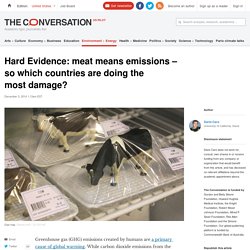
While carbon dioxide emissions from the burning of fossil fuels and changes in land use make up the largest share of these emissions, non-CO2 greenhouse gases such as methane (CH4) and nitrous oxide (N2O) contribute substantially to overall warming and livestock – and the meat that we eat – is a big contributor. The Intergovernmental Panel on Climate Change (IPCC) provides guidelines for estimating livestock emissions on a regional level. Direct emissions of methane and nitrous oxide from livestock worldwide has been recently estimated: they represent about 9% of total GHG emissions caused by human activity. Rebooting Work. Rebooting Work (from a new series for Pacific Standard) Digital and robotic technologies offer us both a bounty of productivity as well as welcome relief from myriad repeatable tasks.
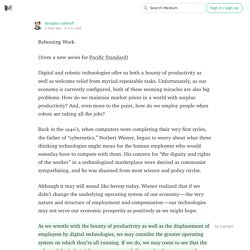
Unfortunately, as our economy is currently configured, both of these seeming miracles are also big problems. Logged In. Support Jacobin this holiday season.
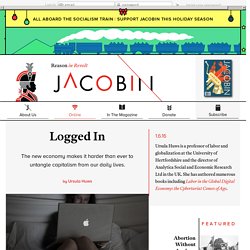
Check out our fundraising video and subscribe or donate today. It’s a familiar pattern. First there’s an economic crisis. Then comes an enormous restructuring of capital — and with it a restructuring of labor — throwing past certainties into doubt. Old industries, companies, and occupations disappear and new ones emerge, enabled by new technologies. What the P2P Foundation did in 2015. 2015 was a year of groundbreaking work and whirlwind travel for the P2P Foundation.
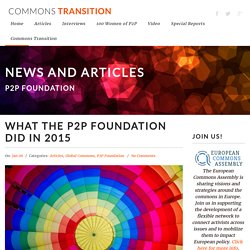
Here are some of last year’s highlights. Our New Organizational Structure We’re pleased to announce that the P2P Foundation’s structure has recently been reorganized around three distinct operational hubs. Given the nature of our work, the distinction between them may be porous. Top 10 P2P Trends of 2015. Article cross-posted from P2P Foundation.
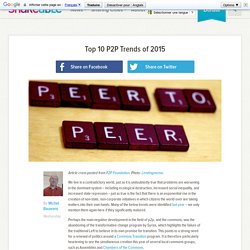
Photo: Lendingmemo. We live in a contradictory world, just as it is undoubtedly true that problems are worsening in the dominant system -- including ecological destruction, increased social inequality, and increased state repression -- just as true is the fact that there is an exponential rise in the creation of non-state, non-corporate initiatives in which citizens the world over are taking matters into their own hands. Top 10 P2P Trends of 2015. Mindful Markets and Value Revolution. Brian Milani Mindful Markets, Value Revolution and the Green Economy: EPR, Certification and the New Regulation Under the radar of mass media and mainstream academia, a value revolution is taking place that is promising to transform humanity’s very notions of wealth and economic development.
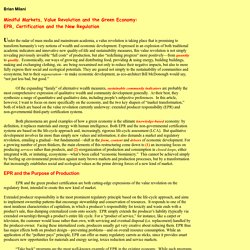
Designing the Green Economy. What They're Saying AboutDesigning the Green Economy "Brian Milani's Designing the Green Economy is a very timely and courageous book.
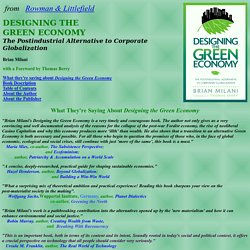
The author not only gives us a very convincing and well documented analysis of the reasons for the collapse of the post-war Fordist economy, the rise of neoliberal Casino Capitalism and why this economy produces more ‘illth’ than wealth. He also shows that a transition to an alternative Green Economy is both necessary and possible. For all those who begin to question the promises of those who, in the face of global economic, ecological and social crises, still continue with just ‘more of the same’, this book is a must. " Maria Mies, co-author, The Subsistence Perspective; and Ecofeminism; author, Patriarchy & Accumulation on a World Scale. The New Green Revolution: How Twenty-First-Century Science Can Feed the World. Some crises appear and disappear in global media while remaining acute in the lives of real people.
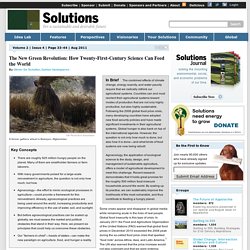
Global food insecurity is this type of crisis. In January 2011 the Food and Agriculture Organization of the United Nations (FAO) warned that global food prices in December 2010 exceeded the 2008 peak during the so-called food price crisis that sparked “food riots” across Africa, Asia, and Latin America.1 The UN also warned that the price increase would not stop overnight and that we were entering “danger territory.”2 Although prices stabilized in the spring, global food prices in May 2011 remained higher than they were in June 2008. We will see more price spikes in the future, due to a growing discrepancy between supply and demand, the impacts of climate disruption on agricultural production, and the merger of the energy and food markets. The New Green Revolution: How Twenty-First-Century Science Can Feed the World. Foster 2014 The Theory of Unequal Ecological Exchange.
Metabolic rift. Metabolic rift is Karl Marx's notion of the "irreparable rift in the interdependent process of social metabolism,"[1]—Marx's key conception of ecological crisis tendencies under capitalism.
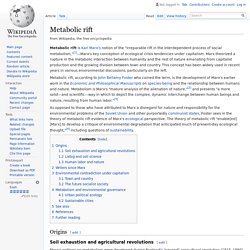
Marx theorized a rupture in the metabolic interaction between humanity and the rest of nature emanating from capitalist production and the growing division between town and country. This concept has been widely used in recent years in various environmental discussions, particularly on the left. Metabolic rift, according to John Bellamy Foster who coined the term, is the development of Marx's earlier work in the Economic and Philosophical Manuscripts on species-being and the relationship between humans and nature. Pierre Bourdieu : Combattre la technocratie sur son terrain. - 12/12/95. E suis ici pour dire notre soutien à tous ceux qui luttent, depuis trois semaines, contre la destruction d'une civilisation, associée à l'existence du service public, celle de l'égalite républicaine des droits, droits à l'éducation, à la sante, à la culture, à la recherche, à l'art, et, par-dessus tout, au travail.
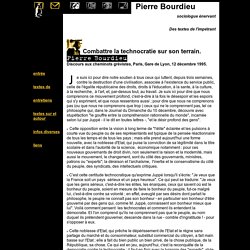
Je suis ici pour dire que nous comprenons ce mouvement profond, c'est-à-dire à la fois le désespoir et les espoirs qui s'y expriment, et que nous ressentons aussi ; pour dire que nous ne comprenons pas (ou que nous ne comprenons que trop ) ceux qui ne le comprennent pas, tel ce philosophe qui, dans le Journal du Dimanche du 10 décembre, découvre avec stupéfaction "le gouffre entre la compréhension rationnelle du monde", incarnée selon lui par Juppé - il le dit en toutes lettres -, "et le désir profond des gens". Nicholas Georgescu-Roegen, La décroissance. Entropie - Écologie - Économie. Jevons paradox. The Jevons paradox has been used to argue that energy conservation may be futile, as increased efficiency may increase fuel use. Nevertheless, increased efficiency can improve material living standards. Further, fuel use declines if increased efficiency is coupled with a green tax or other conservation policies that keep the cost of use the same (or higher).[3] As the Jevons paradox applies only to technological improvements that increase fuel efficiency, policies that impose conservation standards and increase costs do not display the paradox.
History[edit] The Jevons paradox was first described by the English economist William Stanley Jevons in his 1865 book The Coal Question. Jevons observed that England's consumption of coal soared after James Watt introduced his coal-fired steam engine, which greatly improved the efficiency of Thomas Newcomen's earlier design. Paradoxe de Jevons. Best Essays of 2015 (1): Bernard Stiegler on the New Desires of Post-Capitalism. A new society could arise on the same technological base that is now still predominantly destroying the social bonds. The digital networks might be the prime catalysts in the transformation from today’s consumer society into what he calls a ‘society of contribution’. This is a strongly recommended interview to get to know the otherwise difficult writing of that most p2p of philosophers alive today, Bernard Stiegler, and whose ideas on the society of contribution, rather precisely match p2p theory, though at a much greater level of philosophical sophistication, for which the p2p/commons movement must be thankful to Stiegler.
Why Paul Mason is wrong: you can't innovate away social oppression. Video: Sarah Gold on the Need for Peer-Based and Techno-Savvy Citizenship. Mindful Markets and Value Revolution. Comment Amsterdam a réduit ses embouteillages de 20 % grâce au coworking. L'avenir d'Amsterdam, selon Future Cities (Crédit : DR) "Une ville où le social, les infrastructures et solutions technologiques et sociales facilitent et accélèrent le développement économique durable.
" Ainsi la municipalité d'Amsterdam livre-t-elle sa définition de la "smart city". Pour devenir l'une de ces villes pionnières, qui s'appuient sur la technologie et les initiatives citoyennes pour résoudre des défis énergétiques et sociaux, la métropole néerlandaise mène une politique volontariste. How to Make Everything Ourselves: Open Modular Hardware. Collective Action Newsletter. Home. Michel Bauwens : «Vers une économie post-capitaliste» Why I Became a Feminist Socialist. Support Jacobin this holiday season. Michel Bauwens - Better Together Showcase. Nf8485 11murray gilbert goffey. User:Blaqswans. Jean-Marc Jancovici. Dormez tranquilles jusqu'en 2100: pourquoi le dernier livre de Jancovici m'a déçu. Circular Economy (and Global Material and Waste Flows), Part III. From the Communism of Capital to Capital for the Commons - Commons Strategies. a1514 economie collaborative.
a1515 mutuelles de travail. Netarchical Capitalism. On the Lam with Bank Robber Enric Duran. Michel Bauwens on Peer 2 Peer’s Mutual Alignment. Bitcoin: What is it? Michel Bauwens Presentation for the French Senate. P2PandHumanEvolV2. Capital%20and%20class%20in%20peer%20production. Capitalism, Post-Capitalism and Transition Strategies towards a Sustainable and Socially Just P2P Society. How the Bitcoin Protocol Actually Works. Michel Bauwens and the Peer Production Economy. Log into Facebook. Env Innov and Soc Trans. Publications ← P2P Lab. Mapping the emerging Post-Capitalist paradigm and its main thinkers by BlacqSwans - Commons Transition. Ebooksclub.org The Second Law of Economics Energy Entropy and the Origins of Wealth The Frontiers Collection. The Second Law of Economics: Energy, Entropy, and the Origins of Wealth. K%C3%BCmmel aspo2012. Se connecter à Facebook. Neither In Nor Out — Towards a socio-economic community of European peoples — Light on a Dark Mountain.
The high road towards p2p is dying, prepare yourself for the low road. Keynote by John Perry Barlow. Capital%20and%20class%20in%20peer%20production. Network Effects — The Enspiral Network. Michel Bauwens NZ Tour — The Enspiral Network. Communism of capital to capital for commons. Possible Utopias and the need for a Social Knowledge Economy - Guerrilla Translation! La transition n'est pas un long fleuve tranquille. Commons Strategies Group: The Website! Possible Utopias and the need for a Social Knowledge Economy - Guerrilla Translation! Michel Bauwens and the Peer Production Economy. Commons Strategies Group Conferences & Events. World Economic Forum - Alain Wouters. Les zélés du désir - Frédéric Lordon. Michel Bauwens : « Quand survient le chaos, il faut déjà avoir les solutions » Et si le numérique avait besoin de penseurs féroces, de sociologues pirates et de rêveurs lucides.
Essay of the Day: Common Wealth Trusts as Structures of Transition. Secular stagnation and the financial sector (updated) From basic income to social dividend: sharing the value of common resources. Imagining the (R)Urban Commons in 2040. A Introduction to Basic P2P Ideas. Special Reports Archives. Community Land Trusts, Urban Land Reform and the Commons. Impératif Transition. Imagining the (R)Urban Commons in 2040. How Platform Coops Can Beat Death Stars Like Uber to Create a Real Sharing Economy. How Uber Took Over Portland: Release the Lobbyists! Ré-approprions nous l'économie collaborative